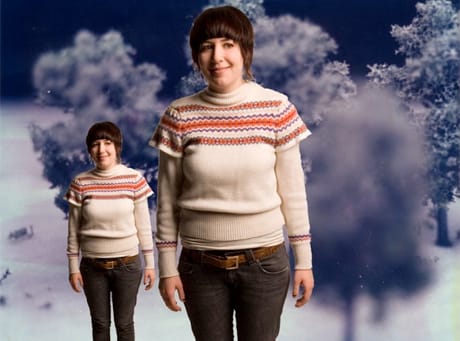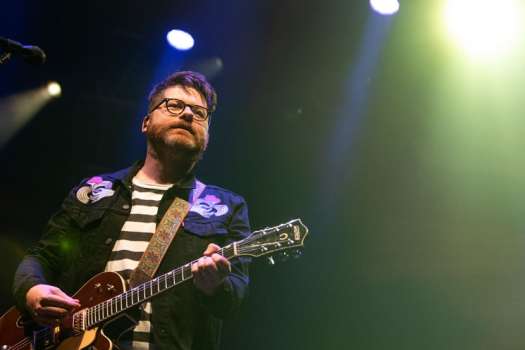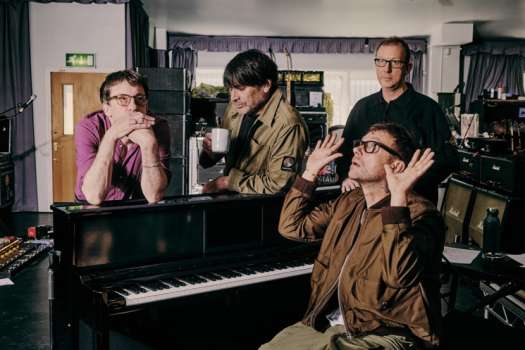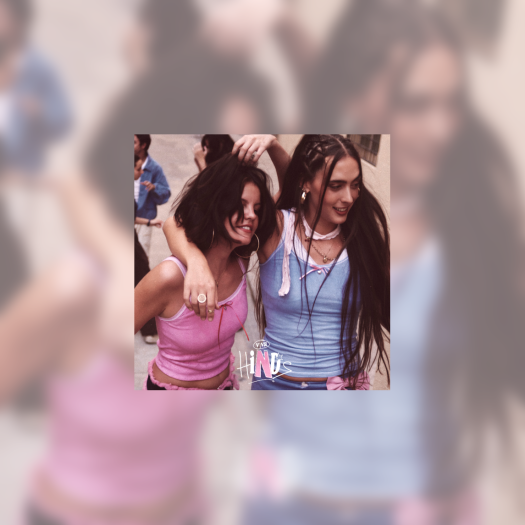Torontos Katie Stelmanis turned away from a life-long regimen of classical training to try her own thing as a songwriter. A musical overachiever, she practised piano obsessively throughout her teens and played viola in the school orchestra; after high school, she went from studying opera to wailing on a guitar she couldnt play in the messy-by-design Galaxy. With Join Us, shes found a way back to her classical routes through MIDI recording, which allowed her to write and record the album by herself. Stelmanis solo work is a shock to those who remember the platinum-haired, baby doll-dress wearing Galaxy girl; layered, dark, and, moreover, "legit, Join Us is a dramatic mix of classical techniques and contemporary ideas. Stelmanis met with Exclaim! at Torontos Java House to talk about childrens choir mishaps, performance art and the allure of DIY.
My first reaction when I heard the record was total surprise, knowing the kind of music you played in Galaxy. I had no idea that you had had so much technical training have you gotten this speech a lot?
I guess a lot of people were surprised it was something that I had never really brought out into the world People who know me probably werent that surprised, because they knew that I was always really into classical.
When you started working on the record, did you expect it to see a proper release?
I think that when I first started working on it, I didnt really know what I was getting into. I knew that I wanted to start working with other instruments, which is why I got into MIDI, because I was able to use basically any instrument through the keyboard I started performing the stuff because I used to do soundtracks for my roommate, Zeesy Powers, soundtracks for a lot of her performance art stuff. And then slowly, I started performing it, people kind of liked what I was doing, so I thought it might be a good idea to release a record. And once I had the idea of a record in my mind, a lot of different stuff came out. I tried to make a record rather than having broken up songs.
What did the soundtracks consist of?
Zeesy does shadow puppet shows, and she does shows where she has a video, and then shell put herself live in front of the video, and sort of interact with it. Wherever possible, I would do stuff live live piano, live whatever, but I would always play with a pre-recorded backing track, so thats why I started recording, just doing it myself.
Tell me about your training.
Im classically trained I studied piano for my whole life, pretty much. And the same with vocals. I was doing choirs all my life, and then I started privately training to be an opera singer when I was 16, which is when you kind of start going in that direction. I did that until I was about 20, and that definitely had a huge influence on the way I sing now. I always had a voice, but the particular training that I went into, I find its a very non-North American way of singing a lot of North American singers are very focused on the words, whereas the way I was taught to do it, its just all about the vowels, and the shape of your mouth, and the sound rather than the words that are coming out.
Can you tell me any good stories about your choir and band class days?
When I was in the [Canadian Childrens Opera Chorus], every year we would have a Christmas concert at the Glenn Gould Studio. We would be wearing these huge long black tunics, and white blouses with these little red bowties, and we would be under these blazing hot lights for probably 30 to 40-minute periods. And we would just stand there with our arms at our sides we werent allowed to move at all. I guess because of the heat, and because kids were nervous, kids would always faint, and if a kid fainted, you werent allowed to stop, the show would jut keep on going. If you watched it from the audience, you would see kids randomly drop, but nothing would happen itd just be, suddenly, a space. One time a kid actually vomited on the stage, and we just kept on going. A kid vomited! And then a bunch of other kids got freaked out and moved away. Its just a funny thing to watch, because its a perfect line of people, everybodys wearing matching outfits and standing in a perfect line, and then you just have these kids dropping, or a kid vomiting.
You did this year after year and nobody ever thought to change the outfits or lower the lights?
Yeah, well we had like fainting coaching. If you feel like youre going to faint, dont be afraid to sit down, make sure to drink water before you go on the stage but there would always be kids that would just drop.
What made you diverge from your classical routes?
I think, if I were to have stayed classical, it would be performing stuff thats already been done. But I had a huge interest in doing my own stuff I think Galaxy was really good for me, because Galaxy was just the polar opposite of what I had been doing. It was all completely DIY, we didnt know how to play guitar, we didnt know how to write songs, we didnt know how to be a band, we didnt know how to do any of this stuff, and we sort of figured it out together.
Are you more serious about the solo stuff?
Yeah, I think at the beginning, we were all really serious about Galaxy well I was always the most serious, because I just wanted to be successful all the time. But yeah, it took probably two years to realise that Galaxy wasnt really going to do it for me, and then eventually we all realised that It only used a very small part of my musical self, I guess. Even in terms of singing my singing wasnt a huge thing in it, so it was always me and Emma [McKenna] sharing everything, sharing roles.
And you wanted to be in the spotlight.
Yeah, basically.
Having an ear for this kind of thing, do you recognise a lot of people combining classical training with new ideas at this point?
I think theres definitely a lack of people doing it well. My drummer goes to U of T, so Ive spent a lot of time [there] I find that line isnt crossed very often. And its funny, Final Fantasy he started doing what he did in the indie world, and everybody was completely and utterly blown away. And my drummer Maya [Postepski] actually told me that there was a class at U of T that was studying one of his pieces so that they could find all the mistakes and talk about why hes so famous.
I know that Galaxy addressed these kinds of things is the female singer-songwriter designation redundant, or is it important to keep proving that female musicians can play?
I think its definitely important to keep proving that female musicians have as much talent as anybody else. Galaxy was really political, and that was mostly fronted by the other guitarist, Emma McKenna feminist politics were as important to her as the music. But for myself and for Maya, we were happy to be saying these things, and happy to be a part of it, but I had never really thought of music as something political. I really like having a girl band, and I really like playing with girls on the stage, because I think its definitely something you dont see very often. What I like about what Im doing now is that a lot of the time, when people think of girl bands, they think of riot grrrl bands I think its interesting to see girls on the stage that are actually really classically trained, that have a really meticulous playing style.
My first reaction when I heard the record was total surprise, knowing the kind of music you played in Galaxy. I had no idea that you had had so much technical training have you gotten this speech a lot?
I guess a lot of people were surprised it was something that I had never really brought out into the world People who know me probably werent that surprised, because they knew that I was always really into classical.
When you started working on the record, did you expect it to see a proper release?
I think that when I first started working on it, I didnt really know what I was getting into. I knew that I wanted to start working with other instruments, which is why I got into MIDI, because I was able to use basically any instrument through the keyboard I started performing the stuff because I used to do soundtracks for my roommate, Zeesy Powers, soundtracks for a lot of her performance art stuff. And then slowly, I started performing it, people kind of liked what I was doing, so I thought it might be a good idea to release a record. And once I had the idea of a record in my mind, a lot of different stuff came out. I tried to make a record rather than having broken up songs.
What did the soundtracks consist of?
Zeesy does shadow puppet shows, and she does shows where she has a video, and then shell put herself live in front of the video, and sort of interact with it. Wherever possible, I would do stuff live live piano, live whatever, but I would always play with a pre-recorded backing track, so thats why I started recording, just doing it myself.
Tell me about your training.
Im classically trained I studied piano for my whole life, pretty much. And the same with vocals. I was doing choirs all my life, and then I started privately training to be an opera singer when I was 16, which is when you kind of start going in that direction. I did that until I was about 20, and that definitely had a huge influence on the way I sing now. I always had a voice, but the particular training that I went into, I find its a very non-North American way of singing a lot of North American singers are very focused on the words, whereas the way I was taught to do it, its just all about the vowels, and the shape of your mouth, and the sound rather than the words that are coming out.
Can you tell me any good stories about your choir and band class days?
When I was in the [Canadian Childrens Opera Chorus], every year we would have a Christmas concert at the Glenn Gould Studio. We would be wearing these huge long black tunics, and white blouses with these little red bowties, and we would be under these blazing hot lights for probably 30 to 40-minute periods. And we would just stand there with our arms at our sides we werent allowed to move at all. I guess because of the heat, and because kids were nervous, kids would always faint, and if a kid fainted, you werent allowed to stop, the show would jut keep on going. If you watched it from the audience, you would see kids randomly drop, but nothing would happen itd just be, suddenly, a space. One time a kid actually vomited on the stage, and we just kept on going. A kid vomited! And then a bunch of other kids got freaked out and moved away. Its just a funny thing to watch, because its a perfect line of people, everybodys wearing matching outfits and standing in a perfect line, and then you just have these kids dropping, or a kid vomiting.
You did this year after year and nobody ever thought to change the outfits or lower the lights?
Yeah, well we had like fainting coaching. If you feel like youre going to faint, dont be afraid to sit down, make sure to drink water before you go on the stage but there would always be kids that would just drop.
What made you diverge from your classical routes?
I think, if I were to have stayed classical, it would be performing stuff thats already been done. But I had a huge interest in doing my own stuff I think Galaxy was really good for me, because Galaxy was just the polar opposite of what I had been doing. It was all completely DIY, we didnt know how to play guitar, we didnt know how to write songs, we didnt know how to be a band, we didnt know how to do any of this stuff, and we sort of figured it out together.
Are you more serious about the solo stuff?
Yeah, I think at the beginning, we were all really serious about Galaxy well I was always the most serious, because I just wanted to be successful all the time. But yeah, it took probably two years to realise that Galaxy wasnt really going to do it for me, and then eventually we all realised that It only used a very small part of my musical self, I guess. Even in terms of singing my singing wasnt a huge thing in it, so it was always me and Emma [McKenna] sharing everything, sharing roles.
And you wanted to be in the spotlight.
Yeah, basically.
Having an ear for this kind of thing, do you recognise a lot of people combining classical training with new ideas at this point?
I think theres definitely a lack of people doing it well. My drummer goes to U of T, so Ive spent a lot of time [there] I find that line isnt crossed very often. And its funny, Final Fantasy he started doing what he did in the indie world, and everybody was completely and utterly blown away. And my drummer Maya [Postepski] actually told me that there was a class at U of T that was studying one of his pieces so that they could find all the mistakes and talk about why hes so famous.
I know that Galaxy addressed these kinds of things is the female singer-songwriter designation redundant, or is it important to keep proving that female musicians can play?
I think its definitely important to keep proving that female musicians have as much talent as anybody else. Galaxy was really political, and that was mostly fronted by the other guitarist, Emma McKenna feminist politics were as important to her as the music. But for myself and for Maya, we were happy to be saying these things, and happy to be a part of it, but I had never really thought of music as something political. I really like having a girl band, and I really like playing with girls on the stage, because I think its definitely something you dont see very often. What I like about what Im doing now is that a lot of the time, when people think of girl bands, they think of riot grrrl bands I think its interesting to see girls on the stage that are actually really classically trained, that have a really meticulous playing style.




